For the 2025 school year, there are 3 public elementary schools serving 1,971 students in Gardner School District. This district's average elementary testing ranking is 2/10, which is in the bottom 50% of public elementary schools in Massachusetts.
Public Elementary Schools in Gardner School District have an average math proficiency score of 25% (versus the Massachusetts public elementary school average of 40%), and reading proficiency score of 24% (versus the 42% statewide average).
Minority enrollment is 42% of the student body (majority Hispanic), which is less than the Massachusetts public elementary school average of 49% (majority Hispanic).
Overview
This School District
This State (MA)
# Schools
5 Schools
1,360 Schools
# Students
2,907 Students
605,604 Students
# Teachers
181 Teachers
51,596 Teachers
Student : Teacher Ratio
16:1
16:1
District Rank
Gardner School District, which is ranked within the bottom 50% of all 393 school districts in Massachusetts (based off of combined math and reading proficiency testing data) for the 2021-2022 school year.
The school district's graduation rate of 80-84% has stayed relatively flat over five school years.
Overall District Rank
#333 out of 397 school districts
(Bottom 50%)
(Bottom 50%)
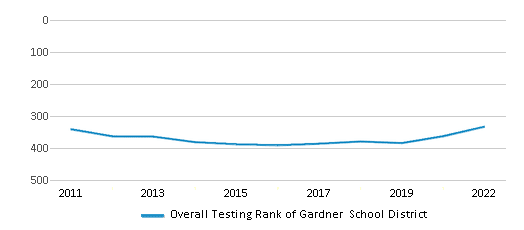
Math Test Scores (% Proficient)
26%
41%
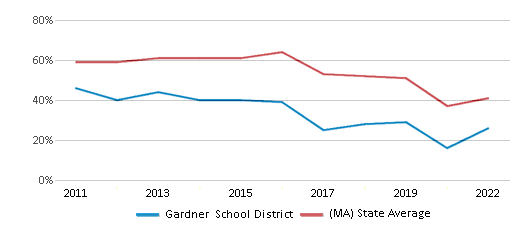
Reading/Language Arts Test Scores (% Proficient)
28%
44%
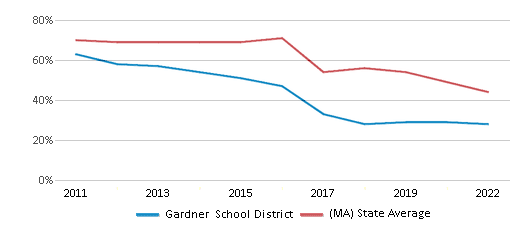
Science Test Scores (% Proficient)
26%
44%
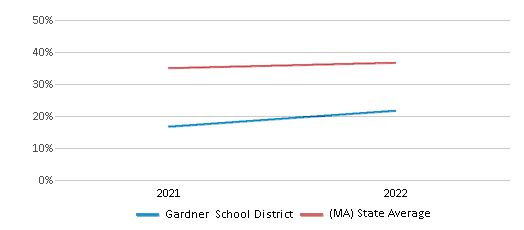
Graduation Rate
80-84%
90%
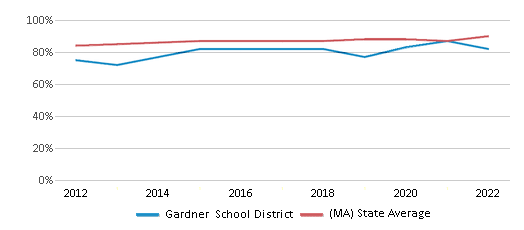
Students by Ethnicity:
Diversity Score
0.58
0.66
# American Indian Students
8 Students
1,446 Students
% American Indian Students
n/a
n/a
# Asian Students
41 Students
44,247 Students
% Asian Students
2%
8%
# Hispanic Students
835 Students
157,705 Students
% Hispanic Students
29%
26%
# Black Students
112 Students
61,567 Students
% Black Students
4%
10%
# White Students
1,693 Students
310,647 Students
% White Students
58%
51%
# Hawaiian Students
n/a
511 Students
% Hawaiian Students
n/a
n/a
# Two or more races Students
202 Students
29,006 Students
% of Two or more races Students
7%
5%
Students by Grade:
# Students in PK Grade:
174
20,531
# Students in K Grade:
375
58,912
# Students in 1st Grade:
380
64,458
# Students in 2nd Grade:
198
66,664
# Students in 3rd Grade:
174
64,731
# Students in 4th Grade:
187
65,978
# Students in 5th Grade:
156
67,142
# Students in 6th Grade:
183
67,086
# Students in 7th Grade:
144
56,371
# Students in 8th Grade:
168
53,443
# Students in 9th Grade:
181
5,579
# Students in 10th Grade:
184
5,198
# Students in 11th Grade:
213
4,867
# Students in 12th Grade:
187
4,504
# Ungraded Students:
3
140
District Revenue and Spending
The revenue/student of $14,923 in this school district is less than the state median of $23,845. The school district revenue/student has declined by 23% over four school years.
The school district's spending/student of $15,382 is less than the state median of $24,602. The school district spending/student has declined by 23% over four school years.
Total Revenue
$43 MM
$21,850 MM
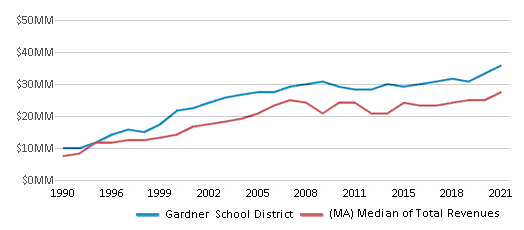
Spending
$45 MM
$22,544 MM
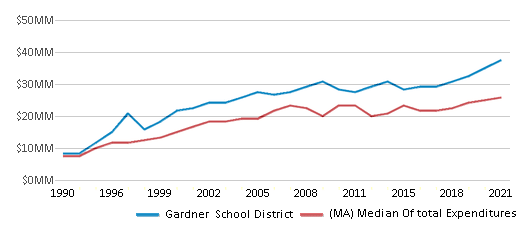
Revenue / Student
$14,923
$23,845
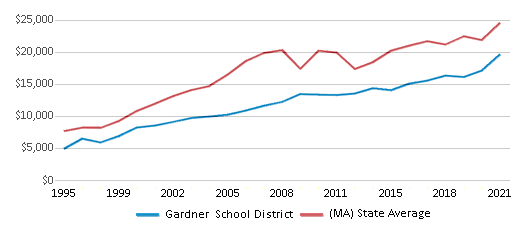
Spending / Student
$15,382
$24,602
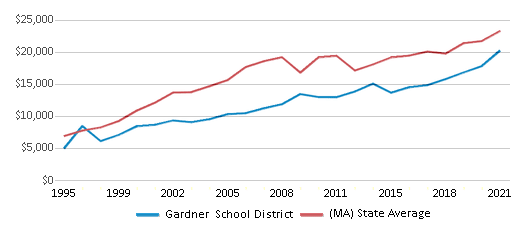
Best Gardner School District Public Elementary Schools (2025)
School
(Math and Reading Proficiency)
(Math and Reading Proficiency)
Location
Grades
Students
Rank: #11.
Gardner Elementary School
(Math: 26% | Reading: 25%)
Rank:
Rank:
2/
Bottom 50%10
278 Pearl Street
Gardner, MA 01440
(978) 991-0900
Gardner, MA 01440
(978) 991-0900
Grades: PK-4
| 1,053 students
Rank: #22.
Gardner Middle School
(Math: 25% | Reading: 24%)
Rank:
Rank:
2/
Bottom 50%10
297 Catherine Street
Gardner, MA 01440
(978) 632-1603
Gardner, MA 01440
(978) 632-1603
Grades: 5-7
| 483 students
Rank: n/an/a
62 Waterford Street
Gardner, MA 01440
(978) 632-1605
Gardner, MA 01440
(978) 632-1605
Grades: PK-1
| 435 students
Recent Articles

What Is A Charter School?
Explore the world of charter schools in this comprehensive guide. Learn about their history, how they operate, and the pros and cons of this educational innovation. Discover key facts about charter schools, including admission policies, demographics, and funding, as well as what to look for when considering a charter school for your child.

10 Reasons Why High School Sports Benefit Students
Discover the 10 compelling reasons why high school sports are beneficial for students. This comprehensive article explores how athletics enhance academic performance, foster personal growth, and develop crucial life skills. From improved fitness and time management to leadership development and community representation, learn why participating in high school sports can be a game-changer for students' overall success and well-being.

February 05, 2025
Understanding the U.S. Department of Education: Structure, Impact, and EvolutionWe explore how the Department of Education shapes American education, from its cabinet-level leadership to its impact on millions of students, written for general audiences seeking clarity on this vital institution.





